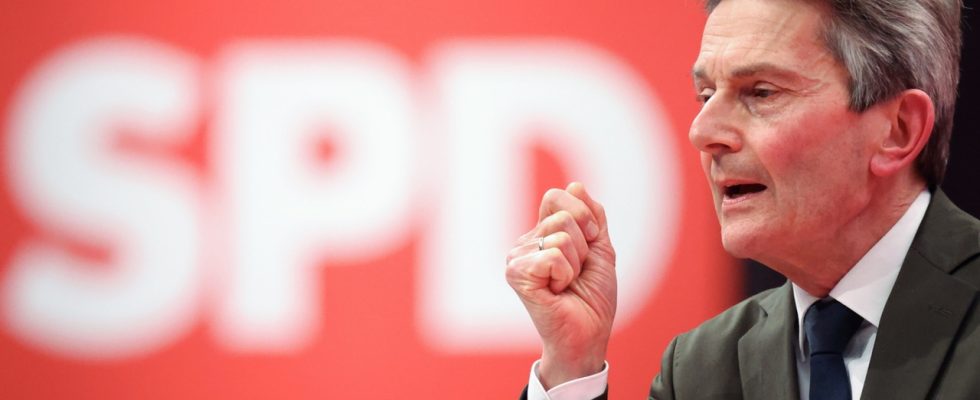Criticism of the traffic light budget savings package is also being voiced within the ranks of the SPD: SPD parliamentary group leader Mützenich is calling for the debt brake to be suspended in the coming year as well. Criticism of the criticism comes from party leader Klingbeil.
The coalition leaders fought hard for the budget compromise, but there is increasing criticism of this – even within the traffic light parties. Now SPD parliamentary group leader Rolf Mützenich has expressed skepticism about the decisions and called for the debt brake to be suspended for the coming year as well. He justified this with the unpredictability of developments in Ukraine and in the world.
In an interview with the Germany editorial network, Mützenich explained that international developments are beyond the influence of national actions: for example, how Russia is continuing its war against Ukraine, which countries continue to support Ukraine and whether the USA is still there. Germany has much more to come than further arms deliveries. Mützenich mentioned help with reconstruction and economic issues.
The debt brake should not be suspended
In the dispute over the 2024 federal budget, the traffic light coalition decided in mid-December that the debt brake would not be generally suspended next year. However, an exception for flood relief in the Ahr Valley is currently being examined. Because of the war in Ukraine, the debt brake should not be suspended for the time being. The coalition reserves the right to take such a step only in the event of a significant change in the situation.
The Basic Law stipulates that the debt brake can be suspended in the event of natural disasters or other exceptional emergencies if the state’s financial situation is significantly impaired. The debt brake was recently suspended again for the current year – for the fourth time in a row.
Mützenich warns against divisions in society
A practice that Mützenich sharply criticizes with regard to aid to Ukraine: “Because we are not allowed to continue making savings in the core budget, we will have to finance these additional funds through the exception regulation under Article 115 of the Basic Law – i.e. by suspending the debt brake.” To him, justifying this decision with aid to Ukraine appears to be constitutional.
“We are in great danger of social division if aid to Ukraine is provided at the expense of important expenditure that is also important for people at home,” said Mützenich. The SPD politician pointed out that the currently planned approach would lead to “domestic distribution conflicts in which one is played off against the other.”
Shaking up the compromise from many sides
On Deutschlandfunk, Mützenich doubted that there was much sigh of relief in politics over the agreement on the budget compromise. “Because those who were involved in it questioned it relatively quickly. Now it has to be addressed in parliament.”
He recalled that just a few hours after the agreement between Chancellor Olaf Scholz (SPD), Vice Chancellor Robert Habeck (Greens) and Finance Minister Christian Lindner (FDP) there had been a correction and the plan for a kerosene tax on domestic flights was replaced by an increase Ticket tax.
There are also movements in the coalition to withdraw from the agreement on other points: In view of violent farmers’ protests, Green Agriculture Minister Cem Özdemir opposed the agreed end to tax breaks for agricultural vehicles and FDP parliamentary group leader Christian Dürr.
Klingbeil criticized Settling movements
Mützenich’s party colleague and SPD leader Lars Klingbeil sharply criticized such withdrawal movements within the coalition partners. “It doesn’t contribute to a better political situation when ministers question the budget compromise five minutes after it was reached. The way I learned politics is that once an agreement has been reached, you defend it and work together to promote it,” he told the “Tagesspiegel”.
Klingbeil, on the other hand, defended the criticism of the implementation of the compromise – for example that Habeck had announced the end of the electric car purchase incentive with just one day’s notice. “That could have been solved differently,” said Klingbeil. “It’s important to me: The SPD is committed to compromise, even if we would of course have imagined many things differently.”
Hans-Joachim Vieweger, ARD Berlin, tagesschau, December 21, 2023 11:07 a.m

